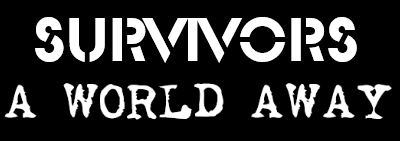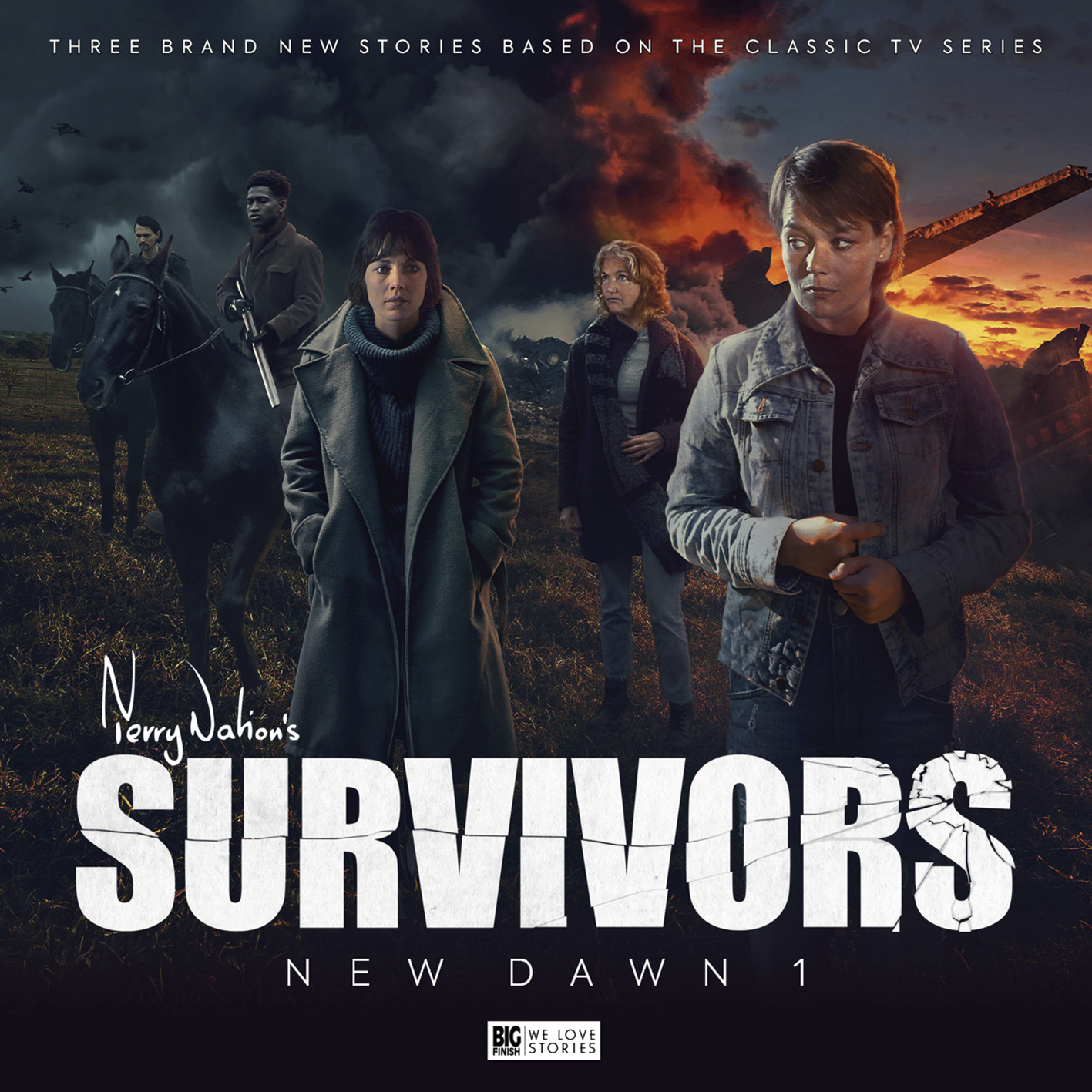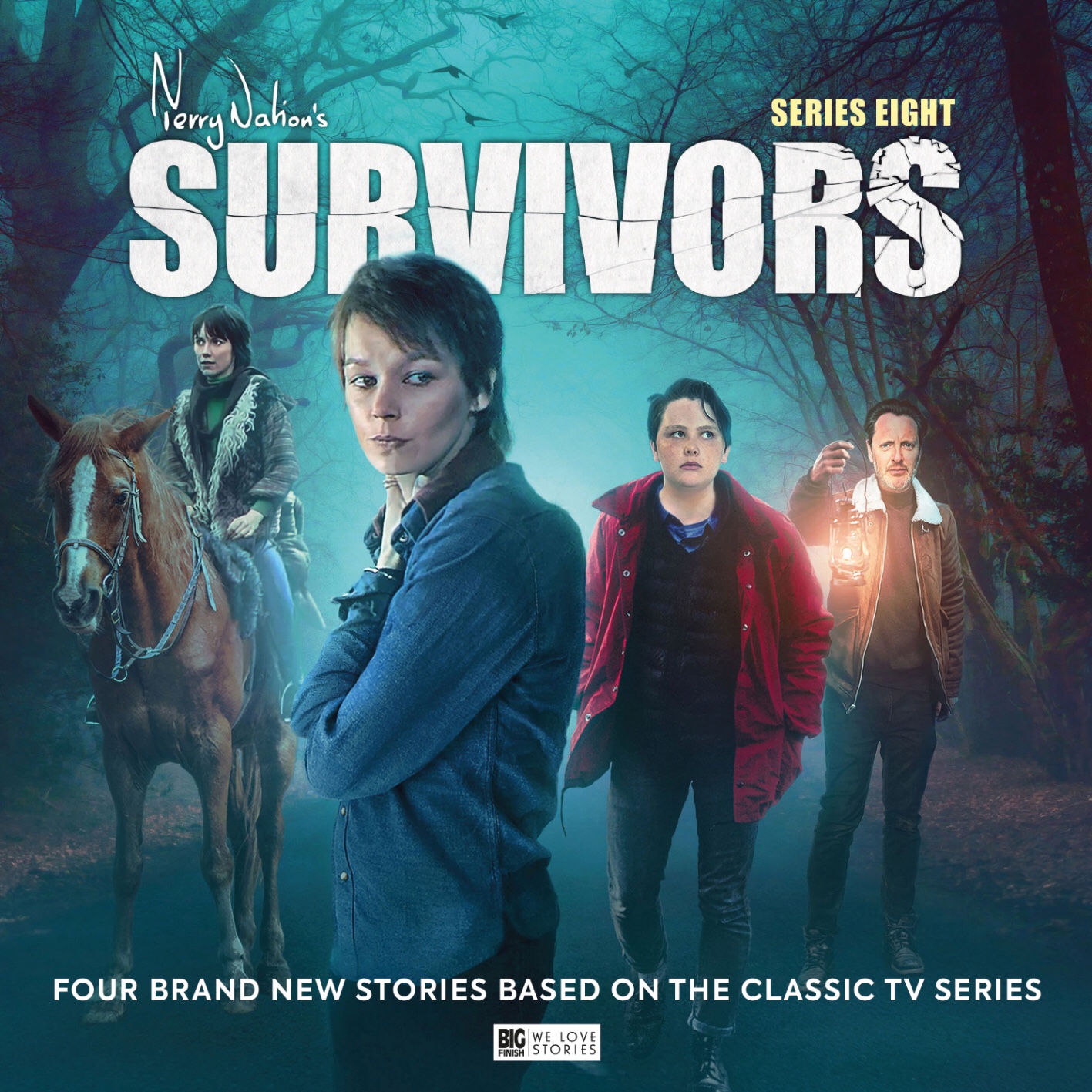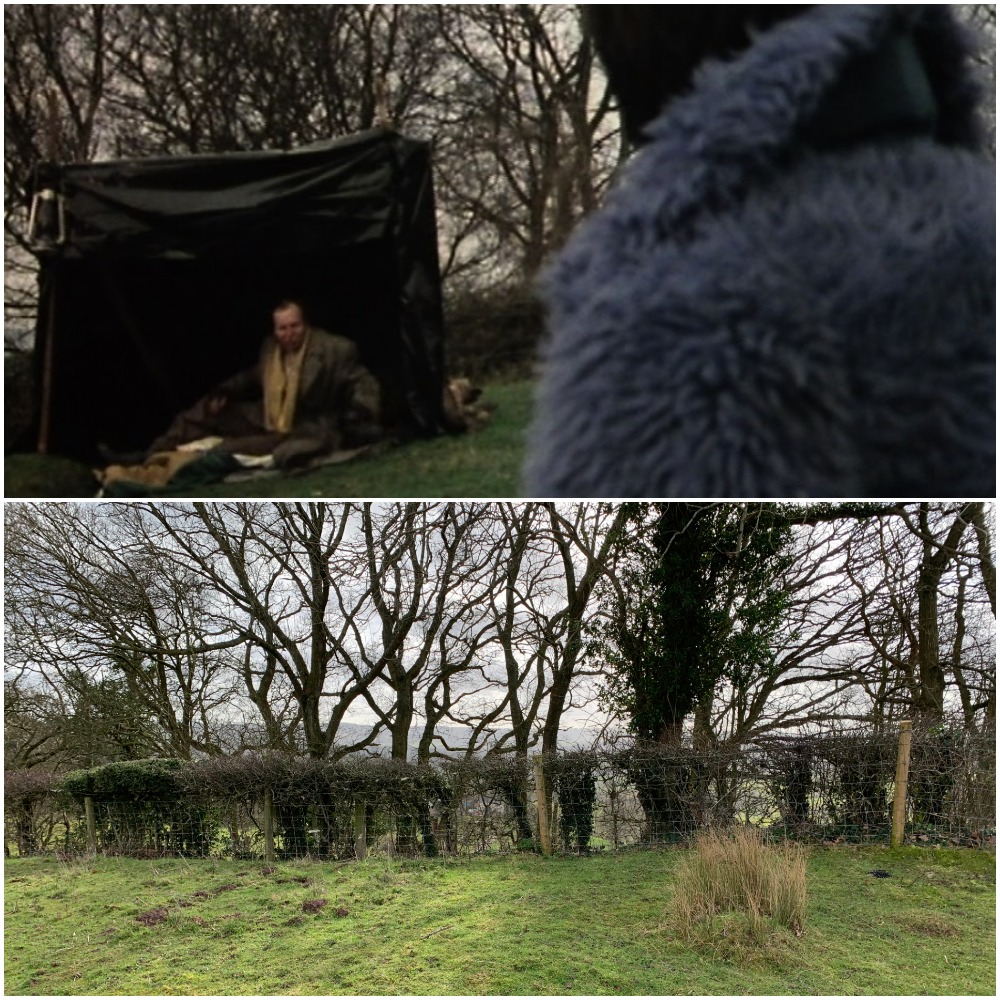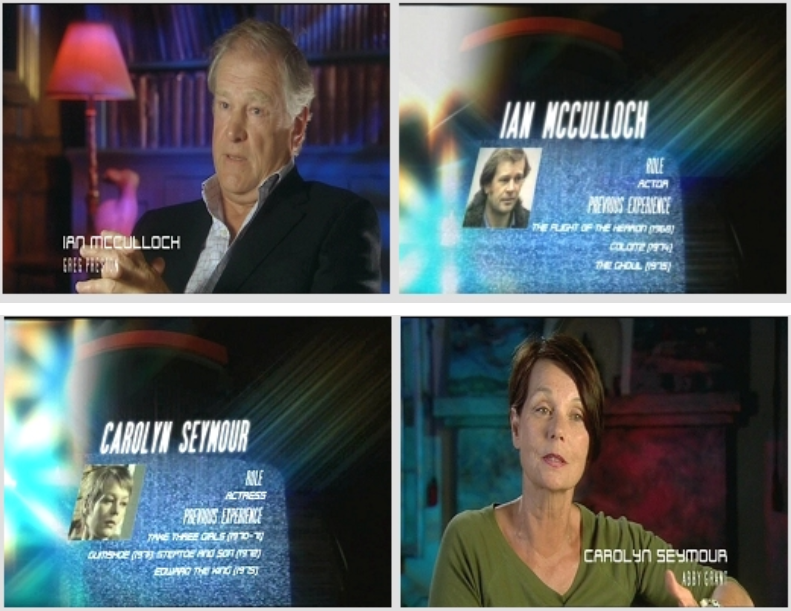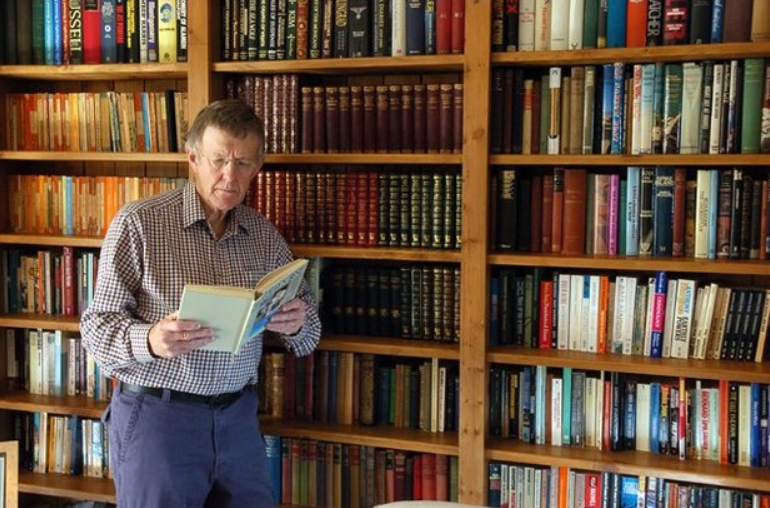
IN A WIDE-RANGING interview, Don Shaw discusses his long career as a scriptwriter for the small screen, including his work on four memorable episodes from the second and third series of Survivors — most celebrated amongst them, Mad Dog.
You joined Survivors as a scriptwriter on the second series in 1976. Had you watched any of the first series of the show the previous year?
I had. Not for from here is the village of Repton, which used to be the capital of Mercia, and a couple of friends of mine had two teenage daughters. I went round one evening and they said 'oh, you've got to watch this - you'll love it Don.' It was Survivors - the first series. And I watched it with them and I was very impressed - I said 'yeah, very, very good. Excellent' - never thinking that I would write for it.
But it clearly had a tremendous impact, not just on the older generation but on the younger generation: which is very sad in a way because today, when you look at the stuff that's on TV, a lot of it is bash-bash, head-to-head confrontation. It's about sex; it's about violence; it's about drugs. It doesn't deal with the basic issues of life - which is essentially life and death, really - which is what faces us all! This is what this series did: it confronted that, and it really excited me. So when I joined it, I had watched the first series - but not all of it.
I knew Terry Dudley because I'd worked with him on Doomwatch. I wrote some episodes for that, and I was one of the first writers on that. It came from Kit Pedler and Gerry Davies, and I worked with them.
Surprisingly, Terry Dudley had me writing a series called The First Lady, which starred Thora Hird. She was a Labour town councillor in northern England - before Survivors, it was in 1969. Terry Dudley got me working on that. I admired Terry Dudley because he was doing some very interesting work at the BBC, and at that time I was very much an up-and-coming hot-shot writer. I was being sought after by The Wednesday Play and Play for Today and things like that. Writing series, at that time, was regarded as being rather 'low'.
If you were a series writer you were not a fully blown dramatist; you were not a playwright - as David Mercer was, as John Hopkins was, as Denis Potter eventually became (he wasn't at that time - when I started, he was just a TV critic). So, yes, I had watched the first series; I knew Terry Dudley. I can't remember whether I contacted him or whether he contacted me, to work on the second and third series. I can't remember.
I admired Terry Dudley because he was doing some very interesting work at the BBC
Don Shaw
The second series is so different to the first. The first series is about loss and the first struggling communities coming together. The second series is much more about self-sufficiency, about survival, about communal living - about the longer term battle. It was very different, and had a very different feel.
Yes, that's quite right. Absolutely.
Was its end-of-the-world and back-to-the-land premise something that intrigued you as a writer?
Yes, it did intrigue me as a writer, tremendously, and some of the questions down here later on - you do touch on some of the things which really sparked me. I've always been fascinated by the greater issues of life, as true dramatists should be. 'Why are we here? What are we doing? What are we coming to? What are our values?' It's enormous, isn't it?
The greatest writer of them all - Shakespeare - dealt with the whole range, not only of those issues but also of human emotions. In this series, it enabled me to explore a whole range of human emotions and ideas, and it liberated me tremendously. It gave me tremendous freedom, like nothing else ever has since. Except that now, in a humorous way, I'm working it into The Hike [Shaw's first novel, published in 2004].
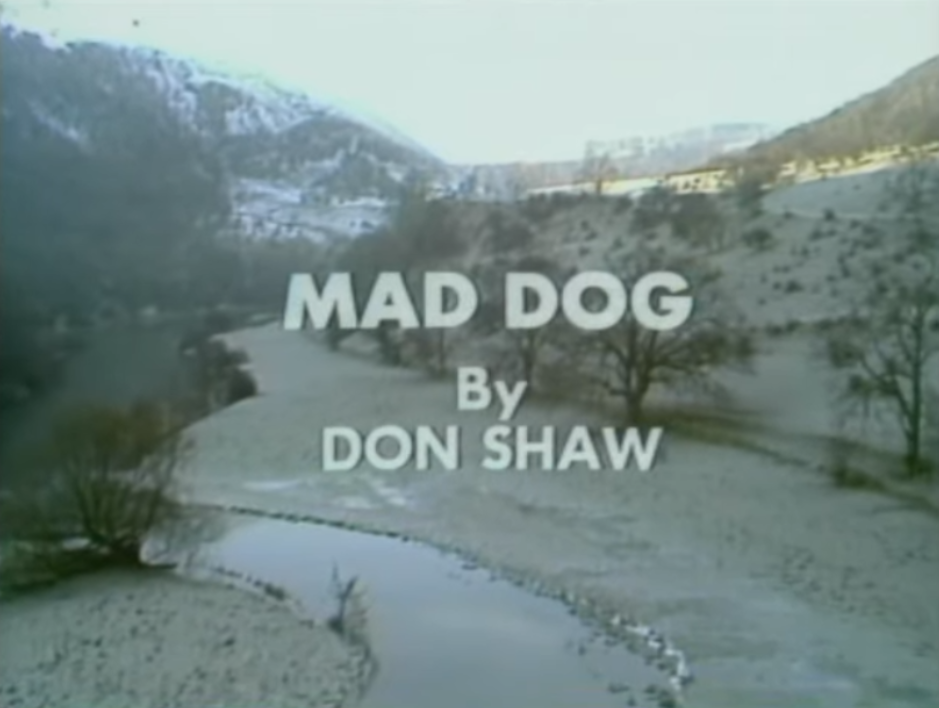
I was brought up in the Second World War. I actually remember the outbreak of the Second World War, my father sitting there opposite to me listening to Chamberlain's broadcast on the radio at 11 o'clock, September 3 1939. I was - what - five? He said 'so therefore, we are at war with Germany'. My father said, 'well that's it. I shall have to go.' My father was a first reserve. He'd been in the Royal Marines actually, as a commando, originally, in the 1920s. He knew he'd be called up, and he went, and he suffered the most appalling injury. He was at Dunkirk, he came back from Dunkirk, having escaped from the beaches, was posted to Northern Ireland, and sent for me.
I was evacuated to Northern Ireland, where I lived on a farm in the middle of nowhere with my mother. And my father was in the hospital miles and miles away in the countryside, buried in the heart of Northern Ireland. He'd been hit by a stray bomb which was really aimed at the Harland & Woolf shipyards in Belfast, May 1941. He was terribly injured; awful injuries. He should have died; didn't die. So I was, from a very young child, brought face to face with the possibility of death and of tragedy. It changed my father completely. I never had a true father after that. It changed him. As I grew up... these things that happen to you as a child - well, there's no doubt that they have a tremendous effect upon you.
Terry hadn't altered a word. He said it was perfect. So I admired him tremendously
Don Shaw
You'd previously worked with Survivors' producer Terry Dudley on Doomwatch - had you built up an effective working relationship with him as a result?
Yes.
In some of the stories that you hear of him, he's quite a formidable character.
Not with me. No, he was fantastic with me. He gave me total freedom, and not only that, but I'll tell you - this has never happened before or since to any other writer, probably in the history of television - I happened to look at a Radio Times once and saw that one of my episodes from series three (I can't remember which one it was at the time) was billed to go out that week, and I hadn't even been to the read-through. I hadn't been asked to change a word, even to dot a comma, or put in an apostrophe 's'.
I rang Terry and [thinking that I'd missed the production meetings] I said 'oh my god, I didn't realise. I'm terribly, terribly sorry.' Because normally the writer goes to the first read-through with the actors and answers questions from them, you see. They'd actually made it, as I'd written it.
That would have been Mad Dog or Reunion.
To be honest, I can't remember. But to have a script submitted that doesn't go through some form of editorial process [is unknown]. Terry hadn't altered a word. He said it was 'perfect'. So I admired him tremendously. Of course, he's gone now. He had a temper. But, no, he was a great guy.
Dudley was keen to bring in new scriptwriters for Survivors' second series. Were you in any way concerned that that the series' creator Terry Nation and writer Clive Exton - who'd both penned scripts for the first series - had opted to leave the show?
Clive Exton - great writer; and Terry Nation - great originator of ideas. Terry Nation – to me he wasn’t the greatest of writers but he had a very inventive mind, he had very, very good ideas for television. Clive Exton was a very good writer.
There’s no doubt about that. Terry was more action – but then of course he devised Doctor Who! He made a lot of money out of that because the BBC did not licence the merchandising of that in those days, so he had the whole of the merchandising. There was nothing going to come out of Survivors like that. I was just happy to work on it. It was a great liberating experience, one of the great joys of my life really, because we had a tremendous audience.
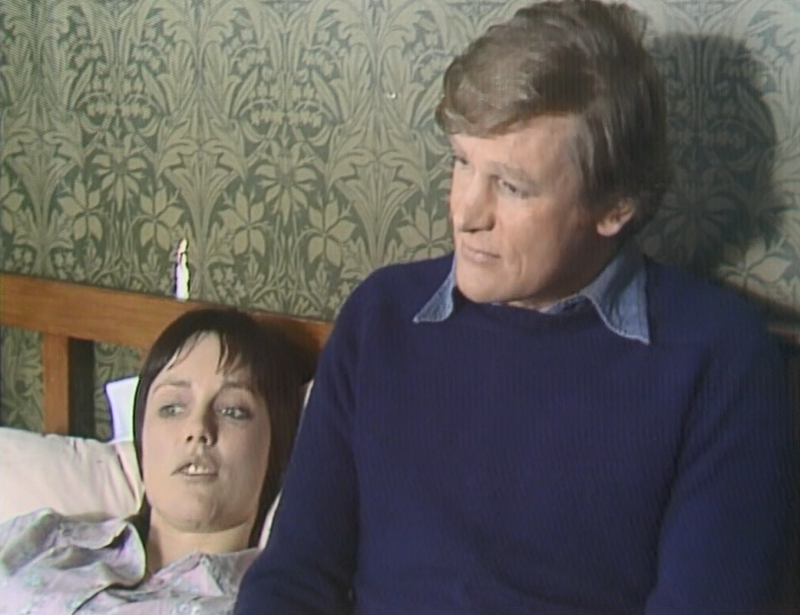
But you weren't concerned about their departure?
It didn't matter to me in the slightest. I was thrilled by it, in fact, because it gave me more freedom. I hadn't got the originator of the series acting in a kind of unofficial script editor capacity. You know that I wrote Dangerfield for BBC1. That was an interesting series because it dealt with a police surgeon's work, which had never been shown on TV before. A man whose just died was Dr Dangerfield - Mick Fletcher was a police surgeon in Derby. It didn't bother me in the slightest.
Almost 'exciting', in a sense? The vista opens up and there are fewer constraints.
Absolutely, absolutely. Wonderful.
How detailed were the situation and character outlines that you were given to work from - were things very detailed and proscribed, or more sketchy and open-ended?
Well, all that happened was - because there were no home videos in those days, they couldn't give you a video to look at - you were given the old scripts, and you watched what was going out live. And they were not detailed, they were more sketchy and open ended. I met Terry and a couple of the other writers. We'd have a parley for two or three hours and then go away and do it.
I think the great success of Survivors lay in the fact that writers were trusted, they were allowed their heads. 'Do it, do it as you see it. Don't bother about ratings.'
Nobody looked at ratings in those days. The producers never looked on the Monday morning for how many people had watched it overnight, if it went out on the Saturday or Sunday night. Nobody bothered in the slightest.
I think the great success of Survivors lay in the fact that writers were trusted, they were allowed their heads
Don Shaw
I wrote Wingate, which was one of the greatest things I've ever done, for BBC1, and it was all done in the Top of the Pops studio, Studio One. It had the deserts and the jungles of Burma, it had Israel, it had everything in it you can imagine. And I got a BAFTA for that. Then we did Bomber Harris, in Studio One, the same studio. None of these were filmed. Everything today is made on film. In those days it was all made by OB camera, large ponderous OB cameras.
One of the best things I ever did - it's a pity you never saw it, and it probably never will be seen - is a play called Question of Honour, which I did for Innes Lloyd - the greatest producer, in my eyes. He did all of Alan Bennett's plays, and he did most of mine. Innes commissioned me to write a play set around the outbreak of the First World War, August 21-22 1914, the Battle of Mons - the first battle the British Army were engaged in. And I wrote a play around that, because for centuries the British Army had been 'upstanding on the field of battle', right back to Agincourt. But in the Battle of Mons, they lay down and they slaughtered the Germans as they were advancing. Why? Because they were advancing upright. Why? Because they'd learnt the dirty tricks of the Boers in the Boer War.
So I wrote a play around this, and it was absolutely fantastic, because it was an OB using huge pedestal cameras. And it was made around a French chateau, near Newbury in Berkshire. Wonderful. And that was the cavalry troops' headquarters. And you could hear the rumble of the guns in the distance, as the First World War was just starting. And they court-marshalled a trooper in the cavalry because he'd killed a German scout by feigning death and then killing him.
And that was a court-marshall offence, punishable by death. Not only that, you were not allowed to use a rusty bayonet, in case it gave you septicaemia. So, you see, the rules of war… the outbreak of the First World War was very gentlemanly, you could still feel the 'field of gold' and Agincourt and all of that.
This all helps to explain my attitude towards drama. No videos existed of it. Before Innes died of cancer ten years ago… He and I did Bomber Harris. We got a BAFTA for that. He said 'I'm going to remake A Question of Honour as a full-scale film.' George Melly, the jazz musician, who was then the TV critic for The Observer, gave it a fantastic review. It was shown three times on BBC television, which was very, very unusual. They do a repeat, but never show it three times.
So I had been bloodied in television drama in the golden days of television for the writer, when it came up [on screen] 'A Question of Honour by Don Shaw'. These days it's 'Dangerfield - starring x, y and z', and then somewhere down below 'written by Don Shaw'. The writer has been subordinated to the makers, because today things are in the remit of the director himself. The director is the man, not the writer: which, of course, is nonsense, isn't it, because without a script, the director can do nothing?
When you had those conversations with Terry Dudley, presumably he would give you an indication of what wider story themes he wanted to see moved on in your script? So he would say 'do this as an adventure drama, or as a character drama, but by the end of this I want x over here, and I want this person to have done this…'?
Well, no. He never said that he wanted anything - from my memory. I maybe wrong, because this is a long time ago. What I remember is that he really, really appreciated writers. I think he trusted you, and he picked writers that he could trust. So what happened was that you had the basic outline - not the plot, no, or where it was going even, but where we were at. 'How do you want to take it forward?' In other words, he left it to the writer.
The picture you're presenting is very much one in which the writers are given prominence and recognition, and the producer is really saying 'go play. This is the environment, the is the context. Go and explore.'
Well, that's what it was about. I created Dangerfield for the BBC, and for the third series we had a new producer, with script editor, who were telling me what to do. I did not like that, and it showed, I think…. However, 'how detailed were the outlines?': They were not that detailed. What you had was previous scripts. 'Read those scripts; think about it, and then get back to me on the phone, have a chat, whatever.' Terry was, to me, the most liberating producer, certainly in series drama. It elevated series drama. Soap is an entirely different thing. It's a sausage machine with no shape and no form, it just keeps going out. Whereas this was proper drama. Yet it was made with light Outside Broadcast cameras.
For A Question of Honour we had the big pedestal cameras - huge things for the outdoors. Well, they didn't use them on this, they used lightweight OB cameras. Of course they could not achieve a 'film' effect, because they were not that technically advanced in those days, which they are today. You can hardly tell the difference today between OB and film. So it is remarkable what they did with the technology that they had, in my opinion, anyway. 'How interventionist a figure was Dudley?': He wasn't.
I wrote for an intelligence audience. I wasn't 'writing down', I was writing at my own level
Don Shaw
Your four scripts for Survivors were a real mix of styles and concerned with very different sorts of drama. Did you like the potential to mix action and adventure stories alongside character studies and more emotionally focused pieces?
Yes. I wrote for an intelligence audience. I wasn't 'writing down', I was writing at my own level. I wasn't bothered about the intellectual level of the audience, I was interested in ideas and philosophies. This is what fascinated me, particularly people who are up against it.
This is why Survivors was such a great series, fundamentally. People are tested against the very basic elements of life - life and death. 'If we go that way we may die; if we go that way, we may live. What are we going to do?' It's absolutely fabulous. It opened up all kinds of possibilities for philosophical argument, which I enjoyed particularly. I did enjoy the mix. I'm appalled today by some of the stuff we see today. This was a series of good dramas with a whole range of emotions examined.
It was very cerebral in a way, because it made people think, which was what was intended. Television 'states' today: 'this is it; you don't think; you just watch and enjoy; we're not actually provoking you to think.' Plays do, of course. Single dramas do that, or should do.
Originally there was a very marked delineation between series drama and single plays. Series drama was regarded as down-market. Survivors lifted it to the level of the play, in that it dealt with serious subjects in a serious way.
Had you had the opportunity to visit the Callow Hill settlement where much of the second series was filmed prior to beginning work on your first Survivors scripts?
No, I didn't. But that didn't matter to me so much, at all. When you're writing something, you've seen what you've seen on screen and you've got the previous scripts, a bundle of them, and you work through those. No, it didn't bother me in the slightest.
Your first script, for Greater Love, dealt with the tragic sacrifice of an established character on the show - Paul Pitman. It was also an important scene-setting episode in the series. It was anything but a low-key beginning. Did the importance of this pivotal episode increase the pressure on you to deliver right from the word 'go'?
No, there was no pressure at all. Terry was absolutely superb.
Is it true that the story of the Eyam Plague - which you refer to the episode - provided some inspiration for the story, given the importance of the Biblical edict 'greater love hath no man than he lay down his life for a friend' in the story of Eyam's sacrifice?
Yes it did, absolutely. The The Roses of Eyam - the drama - was written by Donald Taylor (a TV director and writer). Just before that, my agent rang me from London and said 'Don, you live in Derbyshire, why aren't you writing something about the plague at Eyam?' And lo and behold, as so often happens in this world, two brains think alike and it was being done, it was actually being produced, and Don Taylor directed it. It was a very, very good play indeed. It did inspire me, not just his play, but I knew about the Eyam story already. So, it certainly did, no doubt whatsoever.
Were you pleased with how this first script translated to the screen?
Yes, because it was OB, and to me - in those days - it was like film. When I started, with Z Cars and with The First Lady we were allowed two minutes of film per episode of fifty-five minutes, or whatever it was. So you could go out with a film camera and do two minutes and slot it in to the studio recorded pieces. And this OB liberated you.
You could go out and do the whole thing like film; without the quality of film but nevertheless with the freedom of film. You could go onto locations. You could record people on bikes riding down lanes, and people being dragged by horses, suffering rabies, in the depths of the winter. The kinds of things you could never see before. By 1976, the use of OB was well underway, and it was used to great effect.
With that being your first script, you were happy that you'd hit the ground running?
Oh yes, absolutely. To be honest, it was the most satisfying drama series I've ever worked on. There's no doubt about that. It gave the writer such freedom.
You could go out with a film camera and do two minutes and slot it in to the studio recorded pieces
Don Shaw
Did you ever have the chance to visit the set of any of the episodes while production was underway?
Yes, of course. Yes I did - most of them. Monsal Viaduct, for one.
So you were there for the Mad Dog shoot?
Oh yes. Ilam, above Dovedale. That was Ilam village. I remember the actor Morris Perry… I last met at Stratford, he was in one of the Shakespeare productions at Stratford, and I met him afterwards at the Stage Door, and we talked about that and he said 'oh yes, wonderful'. I said 'My god, you were hours being dragged around by a horse in the snow suffering from rabies - supposed to be suffering from rabies - you must have been absolutely frozen.' 'Well', he said, 'it comes with the job; you do it.' Great trooper, wonderful actor, and a delight to work with.
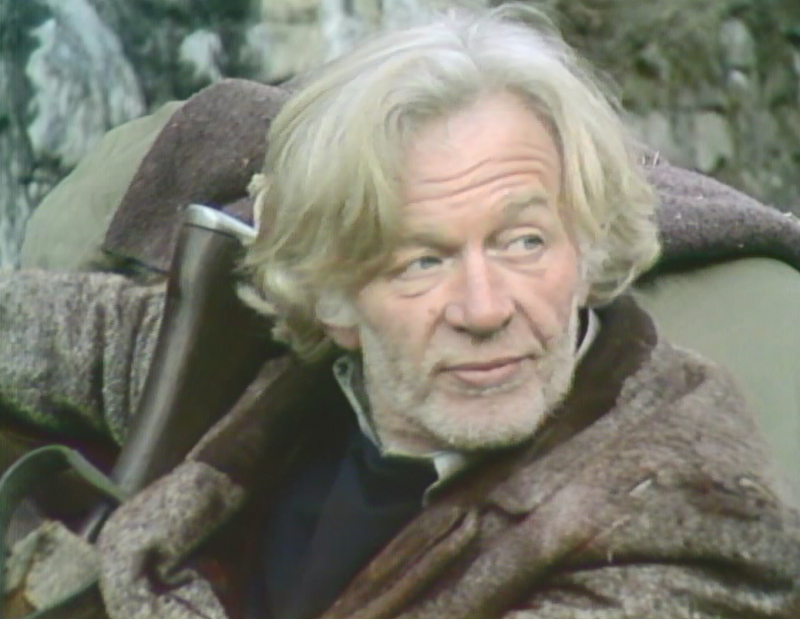
It wasn't necessarily a common occurrence, was it, that writers would go on to the set? Some producers, maybe even some directors, might have been a bit sniffy at the idea.
Well, no, not the people that I worked with. They often liked the writer there. So long as the writer didn't interfere. It would help them occasionally, because they could turn round to the writer and say 'hey, what about this?'
My play, A Question of Honour, by the way, in 1969. It was the first OB in colour that the BBC did, and I remember the technicians standing in the scanner van saying 'look at the grass, isn't that green?' That was wonderful. Did I get the chance to visit any of the sets? Yes, I did, any number of them, any that I wanted to go to.
Your second script Face of the Tiger was another emotionally-charged episode, but one with a number of unexpected plot twists alongside some very rich and articulate dialogue. Was there any pressure on you to tone down any of the very adults themes of the episode - which involved a child killer trying to find a sense of redemption and self-awareness?
No there was none. I just wrote it as I felt. That was one of the most satisfying things I've ever done - that episode. I told you about my childhood, didn't I, and facing death? I was very nearly killed by a bomb in 1940, it landed very close to our house. My father had nearly died in the war. So I was very conscious of life-and-death, and it affected me all my life I think. And again it's in my book The Hike, but in a more humorous way.
It's very much concerned with the recuperative power of nature. It is really richly evoked.
Yes. That's right, that's right. I don't remember a lot about it, I have to admit. I do remember the great satisfaction it gave me. And I've read the script since, and I thought 'god, this is well written, who wrote this? Me!'
John Line's monologue around the kitchen table is very memorable.
Yes, I remember that. It was wonderful to be able to do that. Today, you couldn't get away with it. They wouldn't allow you. They'd say 'god, it's so gloomy'. [Laughs]
Survivors' second series certainly did seem to offer a great variety of settings, situations, tempos, moods and atmospheres. That must have been particularly attractive to contributing screenwriters?
Yes it was very attractive, very liberating. The great matters of life and death could be dealt with more than in any other series then or since.
You're not stuck with a format. There's a premise, obviously, but you're not stuck with the formula that everything must fit this identical template. It's more a case of 'there's the world - go explore'.
That's it: the world's there and the people are there - write about them. At that time there was a very left-wing bias in BBC drama. Terry Dudley didn't suffer from that, neither did Innes Lloyd, my other producer, who was absolutely brilliant, with plays. I did his obituary for The Times, a whole page they gave it. A fabulous producer: Bomber Harris, he did, Wingate with me, and all sorts of stuff. There was no formula, and no formulaic overtones to this whatsoever. It was open.
We could have stayed in the Whitecross community and we could have moved on: there was a choice
Don Shaw
Have you any other memories of your work on the second series - for which you did Greater Love and Face of the Tiger?
No, only that it was so enjoyable - more so than any other series that I've worked on, then or since. So I was very happy with the whole thing and the way that it went. Terry Dudley was a delight. He could be difficult with certain people - it was the chemistry, perhaps, I don't know. I just hit it off - a wonderful chap.
For the third series, Terry Dudley was keen to 'open things up again' and leave behind the Whitecross settlement. Did you think that it was a good idea to reinvent the format in that way, or do you think that there was still dramatic mileage in the struggles of the Whitecross community?
I thought it was both. But I didn't have that of strategic thinking. My job was to get on and write something. There was still dramatic mileage there, we could have stayed in the Whitecross community and we could have moved on: there was a choice. You could have gone on and on and on really. But I didn't have that kind of strategic thinking in mind. I had three weeks in which to write an episode. Three weeks - that was all you had! That was very, very short.
But, of course, dialogue was at a premium in TV then; today it's visual, it's film, and dialogue comes second. We were writing what were in essence theatrical pieces, in a way. Studio drama was very, very close to theatrical work. I watched my Bomber Harris yesterday with my daughter who was here. She'd never seen it before, and I was struck by the wordage: a tremendous amount of dialogue, but it works so tremendously well. It was all made in Studio One, Television Centre, the Top of the Pops studio.
So the answer to that question is both. It was a good idea to reinvent the format, but it was also a good idea to have stayed behind. Personally, I would have stayed behind. But I don't think it was a bad idea to have moved on.
Mad Dog, your first series three script, is widely accepted as one of the best Survivors episodes of the entire run. Who had the initial idea to pluck one of the characters from the drama and plunge them into an adventure of their own?
That was me. That was my idea. I remember thinking about what would life actually be like then without any controls in place - disease would have been a huge problem, and of course there'd be no stopping rabid animals getting into and out of the country. I cannot remember exactly my thought processes, but I'm pretty certain it was me who thought of it.
And there wasn't any worry that you were going to go so far out of the standard format - by focusing on just one of the characters, you were taking away a lot of the things that were familiar about Survivors in this particular episode - that you might stray too far from the path?
No, because for me there wasn't any 'path' - there were just these people clinging to the planet! It was wonderful. I think it could be resurrected today. It could be redone, and, god, how wonderful it would be - with all the technology we have today, in terms of film-making. How fabulous it would be. But the BBC having been playing this game of audience chasing; of trying to compete with ITV. I think they went down the wrong road. They should have stuck to what they did best - which is give good writers their head, and let them get on with it.
Survivors, to me, could easily come back. Because, let's face it, today we're talking about Avian Flu - which could wipe out millions of people! And today there's this awful threat in the background. When I wrote for Doomwatch, no-one knew about pesticides and the dangers to the environment. Birds were falling out of the sky; rabbits were dying of myxamatosis, I remember, at the same time. Rachel Carson had written The Silent Spring in the fifties - the first book that highlighted ecological problems. That was the first book. And when we it came to Doomwatch, with the wonderful Kit Pedler - a scientist, and inventor and great thinker - and Gerry Davies, that was another liberating series - and, of course, Terry Dudley was involved in that. Fabulous stuff.
So when I came to work with Terry, I had no hangs-up about it. I knew him and he knew me, and we knew what we were going to do.
Both director Tristan de Vere Cole and lead actor Denis Lill share an extremely positive view of the Mad Dog script, and remember the relish with which they approached the episode. Neither of them can recall many changes being made to your submitted draft.
Neither can I!
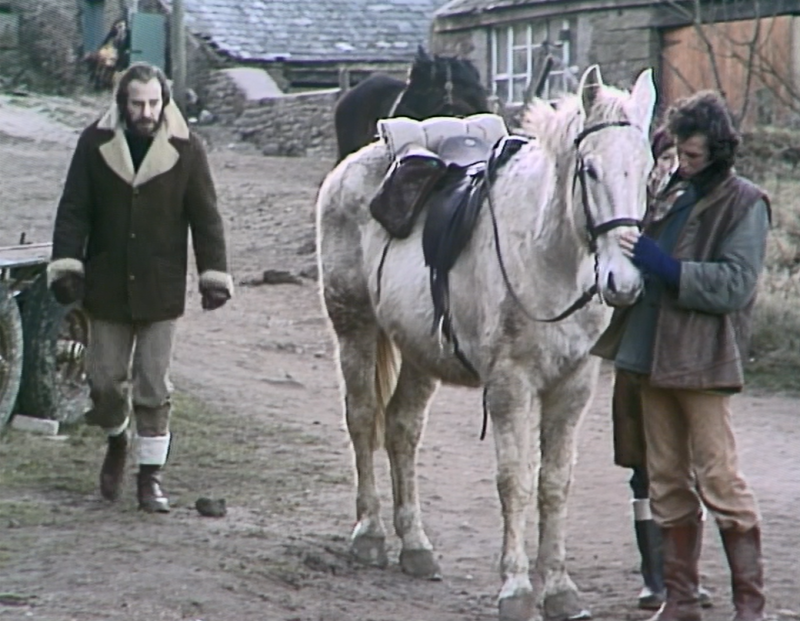
The settings in which Mad Dog takes places - around the Monsal Dale valley and at Air Cottage above the Dovedale gorge - seem so perfect and ideal that it seems inconceivable that you didn't have them in mind when you wrote the script!
I wanted it set in Derbyshire, in the Peak District. That was at my suggestion. But not the exact location, because I'm not a locations manager. I didn't go out and hunt these places down. I do hike around the Peak District. The Hike is all about the Peak District and hiking in the Peak District, and three men who hike in the Peak District. Ilam is one of the famous places and we shot it there, recorded it with OB. I suspect that the locations manager... found this location and thought 'this is a wonderful place, with great visual shots - of the horse coming down the valley; the opening shot' from the Monsal Viaduct.
I remember that scene so well, because I was standing up there behind the camera when it was recorded. I think it was half-and-half. I suggested the Peak District; Terry Dudley fell in line with it; the exact locations I think they picked.
Episodes have their slots, and they have to go out on certain days and you get the weather that you've got
Don Shaw
The snow and ice of Mad Dog help to reinforce the melancholic and isolated atmosphere of the episode - did you write it to be set in the depths of winter?
We couldn't predict that; we could not predict the weather. It just so happened it was like that. In actual fact, I did another OB called Frontier, set between East and West Germany in the Communist period, again produced by Innes Lloyd. We shot it in the depths of winter in a forest near Aldershot and the weather was appalling, but it does not show, the snow didn't, on the OB. If I remember rightly, it doesn't show a great deal in the Survivors episode. There was snow there; there was ice; but the cold undoubtedly was there. You cannot plan for that though.
But that wasn't written into it?
No. You can't do that, you can't do that. It wasn't written into it, because you can't do that. Episodes have their slots, and they have to go out on certain days and you get the weather that you've got. We were just fortunate.
There are a number of distinctive features to the Mad Dog script - not least the dramatic shift from a clash of world views between Fenton and Charles; to a breathtaking adventure chase part way through; and the fact that large sections of the chase take place with little or no dialogue. Did you sense that you had produced something very different to a 'normal' Survivors script?
Yes. In that sense, it became filmic - less dialogue and more action.
It's the unexpected shift that I was getting at. You start with this beautifully written exchange of world-views - between Fenton the misanthrope and the cynic and Charles the man of mission wanting to rebuild the world - and suddenly you're sent somewhere very different, because you don't expect that's where the episode is going to go.
Well, you didn't want to get bogged down in verbiage. Philosophical discussion is not really what drama is about. It's about conflict, basically, isn't it? Dramatic conflict of some sort. So I think that balanced it; gave it a good balance. Again, it was because we had this lightweight Outside Broadcast camera. Which was tremendously liberating.
It was in this episode that Morris Perry was dragged behind a horse. I do remember it so well. They made a little sledge for him to lie on, but it was a very thin sort of sledge. It just kept him off the ground, but when he was dragged it looked as though he was being dragged through the ice - when he was just a little bit off it! But he was bloody cold. He was frozen!
You were there on set for that?
I was there. Oh yes, I was there all the time. Loved it, loved it. We did sense that we'd produced something very different to a normal Survivors script - that's true. I think we did - because it became more filmic.
Did you get any particular feedback after that episode?
I can't remember. All that I remember is that everyone I knew enjoyed it. That's all I remember, from the time.
Your last episode for Survivors, Reunion , is more of a character-driven piece in which the themes of guilt, regret, misunderstanding and - finally - resolution predominate. I think it's a script that encourages the best performance in the series out of child actor Stephen Dudley, who manages to convey some quite complex emotions very effectively.
Of course Stephen Dudley was Terry Dudley's son.
I'm sure Stephen would be the first to accept that he was cast because he was the producer's son.
Of course. It was easy to bring him along to the set.
He wasn't a great natural thespian - but with this particular script the bewilderment plays to his advantage really.
Yes. That's right.
Being something of an uncertain child, in the storyline, it works very well.
Yes.
Did you think that the series spent enough time looking at the very personal issues of guilt, grief and the pain and separation of loss - issues that could be utterly disabling in the context of such a catastrophe?
For me it did, for the scripts that I worked on, yes it did.
By the close of Survivors third series, the first hydroelectric power station had been brought back on line, and money, trade and even a new government council had appeared. Do you think that the return of the rudiments of civilisation brought Survivors to a premature end? Was there enough life in the series' premise to support a fourth and even fifth series of the show?
Of course there was, and there could be today. You could go on and on. I think it's absolutely fascinating. I mean, there have been films… all these Van Damme and Schwarzenagger action movies; people at the end of the world facing Armageddon and survival; Waterworld - which is a not very good film. No, but there are great opportunities, great opportunities: freeing everybody from the civilisation in which we live; putting them against the elements; survival. Wonderful. You could keep going, of course you could.
My most vivid and persistent memory is of the enjoyment of it; the satisfaction
Don Shaw
The argument that some people put is that the series becomes so concerned with bringing back recognisable things from the old world that it becomes less distinctive. You've got money, and you've got electric power - it's becoming a more familiar environment.
Yes, yes. Maybe it did signal the end. Yes, it probably did. In retrospect, thinking about that, I would not have… wanting to go on with the series, I would not have done that - I agree with you. Keep it as it was. It could have gone on.
You see, this was not a series - when you think it about it. It was not a drama series, it was a serial. It was drama. It was like Dickens writing his short stories every week for the newspaper. Short stories were chapters, and it added up to the whole book. That's what it was - it was a serial, wasn't it? It wasn't a series. A series is a one-off in which a whole story is told using the characters that you used the previous week. That's a series drama. This was a serial.
There's quite a lot of use of continuity too - people refereeing back to events and characters. In Reunion, for example, you manage to refer back to some of your own earlier scripts!
Oh, absolutely!
But that sort of adds to the argument. With some programmes, you can show them in any order you like - in an episode, events happen and then things wrap up and leave things in the same state that they started. In Survivors, people die, and there are great developments. So, in that sense, it is very strongly a drama serial.
Definitely a serial - and it could have gone on; I'm absolutely convinced of it.
What is your most vivid and persistent memory about your work on Survivors?
My most vivid and persistent memory is of the enjoyment of it; the satisfaction - being given the task of writing episodes that were your own; that were not given to you; that were not dictated by a script editor. I mean, script editors are, in some ways, the bane of my life; the things I've had to do with script editors, who are not themselves great writers; often they are failed writers. But they can be very disciplinary. They can tell you 'oh, we can't use this; we can't use that. You've got to do that. Oh, dear, dear, dear.' Survivors was free of all that. Terry Dudley, bless him, he gave me the great opportunity to write the stuff that I wanted to write. It was very easy for me, in a way. I didn't find it difficult at all. It just sort of poured out of me!
I found it very simple - not simple, I had to think about it. Of course I did. Nothing's good that comes that easy. But in terms of all the millions of words I've written, I would say that Survivors came the easiest, mainly because I was at my most inspired. Perhaps that was it? Plus the fact that words were at a premium. We were not yet in the film age for television. We were still in that transitory world between studio drama and film.
With those lightweight OB cameras we could go out and explore the environment, as television does at its best. TV at is best is a window on the world. My favourite programme is Time Team, because I love the discovery, the archaeology, the searching for the past - which is very elemental. I love things which are very elemental.
The other joy was my daughter - she's in it, caught at the age of seven or eight for all time - which was magnificent. I'd not got that one on DVD yet. That was a great joy. I think there'll never be another series like it - a serial, like it, unfortunately. But you never know, never know.
It did play into a lot of the feelings and moods of the era - there was lots of concern about the growing power of technology; great ecological concerns. The first series was 1975, and the second was 1976 when you joined. There was a lot of contemporary resonance that it had then. There are different resonances today, but it some ways they are similar - fears about the fragility of the world; and about an uncertain future.
In those days, of course, we were very worried about the atomic bomb, from the fifties onwards. I remember listening to the radio broadcast in 1945: 'a bomb has been dropped on Hiroshima, equal to 20,000 tonnes of TNT'. I remember rushing out as a child and telling my next door neighbour: 'They've dropped a bomb equal to 20,000 tonnes of TNT.' Well, from then on, of course, life became very worrying.
I remember the Cuban Missile Crisis, I was a teacher then. I was teaching in a residential school in Staffordshire. I was a teacher of the deaf. I remember going home at ten o'clock at night, I'd been on duty til ten at the boarding school, and wondering if I might see that glow in the sky which would herald the dropping of the bomb. I was genuinely very, very frightened.
Looking back, with all that we know now, seeing the historical records of what happened at that time, I was right to be frightened. It was very, very close - Armageddon. So when we made this, the world was in a very dangerous state. In some ways it is even more so today. There's international terrorism, of course, but on top of that there are ecological problems; problems about global warming.
Also there's a scepticism now about science - genetic modification and 'designer babies'.
I think the reason why Survivors was very attractive to the audience was that it gave them a vicarious sense of security - of the thrill of being on the edge whilst knowing they were actually secure, watching that. 'What would it be like for me if the world literally was at an end; if most people had died?'. That's what gave it its fascination.
Those were the golden years of television, without a doubt... television drama was right at the top
Don Shaw
How much better would it be today, filming on location, with the colour film that they have? The OB hadn't got the quality - if you look at the texture, the actual resolution on the screen. Not as good, of course, as it is today. Nevertheless, it gave it a raw kind of elemental feel, didn't it? You really believed that you were there.
I remember going down to Ross-on-Wye. You know why they chose that, don't you? There was a very important reason - because it was away from flight paths of civil airliners. They could not afford to catch the sound of an airliner going overhead because you could not wipe it out. And then the next shot, it's gone - five seconds later in the action, and it would have to be there. And they hadn't the technology to deal with it. I don't know if they have today. I'm not a technician. But that was the reason why they went into Wales, to keep away from planes.
I'm a pilot, by the way. I've got my own plane - a Cessna 182. I was flying today, actually. Derby Airfield is only about ten minutes from here.
But it was the golden age of television. I'm the Visiting Professor of Drama at Derby University. My inaugural lecture was called 'The Death of the Playwright'. So you can gather, from what I've said… those were the golden years of television, without a doubt. I remember some Americans coming over. I met them in the lift at Television Centre and they were trying to make out that their TV was so wonderful. 'No it isn't', I said, 'people come here to see British television because we are the best in the world.' And that was one of the few things we could actually say with any pride, because we were losing in so many other respects… everything was going down the pan, but television drama was right at the top.
Don Shaw was interviewed by Rich Cross on 3 March 2005
Cite this web page
Cross, R. (2021). 'Interview: Don Shaw,' [online] Survivors: A World Away, 31 January. Available at: https://www.survivors-mad-dog.org.uk/a-world-away/Interview_Don_Shaw.php. Accessed on: 16 February 2026.
Current style: Harvard
TAGS
